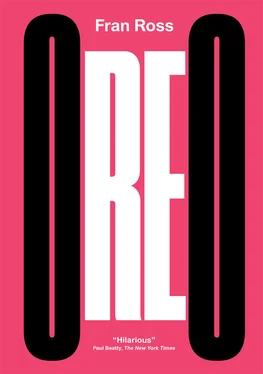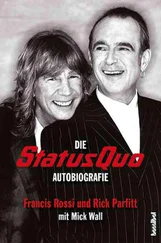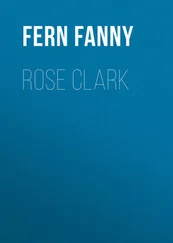The people of Whitehall set up floodlights to play over the outskirts of the neighboring, honky-loving black town, whose lawns (formerly reasonably manicured but now nervously bitten to the quick) bore sad witness to the instant herbaphobia that whites brought with them. Black Whitehall posted sentries and devised elaborate alarm/gotcha systems (the showpiece was a giant microwave oven with the door ajar). The Whitehall PO-lice raised attack dogs on a special ‘‘preview” diet of saltines and the white meat of turkeys. Helen quoted Reverend Smith-Jones as saying, in his down-home way, “If any chalks should be rash enough to come in here, those dogs will jump on them like white on rice.”
“Pass me some tsimmes ,” said Helen, when she had finished with Whitehall. She tasted it, blew her mother a kiss. “You know who made a lousy tsimmes —Mrs. Zipstein.”
At the mention of the wife of the man who had pickled him into anti-Semitism, James stirred in his corner. He immediately went back to concentrating on swallowing the Veuve Clicquot Jimmie C. was feeding him, grinning as he reminisced about Gladstone’s village idiot.
“You ever yere from de daughter? Whatchacall?” said Louise.
“Sadie. Sadie-Above-It-All, the Jewish princess. No, I wonder what ever happened to her.”
Oreo watched with anticipation as her mother got up from her seat to do some shtiklech . “Here’s Mrs. Zipstein,” Helen said. She bent over, holding her back. As she walked, she pointed to her feet. “Mrs. Zipstein has those lumpy black shoes that look like they have potatoes inside — no, like she has a lot of little feet stuck to her regular foot. She’s walking, see? ‘Oi, oi, oi, doit and filt, filt and doit. God to gad id op. Oi, oi, oi.’” Helen straightened up. Instantly she was Sadie being carried on a pillow by Nubian slaves. ‘Be careful with my gown, you graubyon ! You, on the right — don’t glitch or you’ll tear it! This is no shmatte , you know. Cost a fortune.’” Helen/Sadie’s arms flapped helplessly. “‘Oh my God, the floor’s dirty — come quick, somebody, and clean it up. Quick or I’ll turn blue.’” Helen sat down. “Nobody enjoys digging in other people’s dirt, but Sadie can’t even come near her own . She could be sitting on the toilet and she’d say, ‘I’m sorry, I just can’t do it. Somebody, come in and wipe!’ They could cut her salary to a dollar ninety-eight a week and her ‘girl-who-comes- in-twice-a-week’—who’s probably older than her mother — would be the last thing she’d give up. ‘There’s always a shvartze to do these nasty things, so I should worry?’ Ah, but the guilt. ‘I don’t know what it is, Debbie, but I can’t bring myself to stay at home when Beulah’s there. I do my important shopping on those two days.’ Beulah down there on her knees probably reminds her of her mother, Mrs. Clean. As for Mrs. Clean herself, maybe she’s always making with the rubbing and scrubbing because there’s nothing else for a religious Jewish woman to do.” Helen was suddenly a rabbi. “‘Go to the mikvah and stop nudzhing , you dirty women, you. Don’t defile our scholars with your monthlies and your sinful ways. It’s enough, already, and stretching a point besides that we let you light the shabbes candle. So cook, so clean, so make amends.’” Helen paused. ‘‘So vot am I tokkink?” she said, laughing, and changed the subject. “Mother, do you remember when I was going with Freddie Cole, the football player?”
“I disremember de name.”
“You’d remember if you saw him, a real hulk, a Baby Huey. Well, anyway, he says to me on the phone one day, ‘Helen, I’m gon bring you something real special tonight — one perfect rose.’ He must have seen that in a movie or something. Well, anyway, that night, he lumbers up the steps, his ham fist like a misshapen vase for the rosebud he’s clutching.” She paused to demonstrate. Her imitation of Freddie’s bulk and gait was so exact that, in that instant, Louise remembered him. “He gives it to me, and I say, ‘Oh, Freddie, it’s lovely now, but it’s going to be a real beauty when it opens.’ He gives me this dumb look, grabs the rose, and says, ‘Duh, I can fix that.’ And with a rip, a tear, a shred, he breaks open the petals one by one and hands it back to me. ‘Bulvan!’ I screamed, and threw him out.”
Jimmie C. and Oreo laughed, James grinned in his corner, and Louise said, “Bull what?”
A bloom in the bloomers
Talk of roses and mikvahs reminded Oreo that it was time to change her sanitary napkin. She excused herself from the table.
Oreo’s menarche had been at age eight. She had been minding her own business, experimenting to see whether her pet turtle would try to mate with an army helmet, half a walnut shell, or a swatch of linoleum (the “bottom-shell hypothesis”), when she felt a slight contraction in her lower abdomen. She was vague about the area — it happened so fast — but it was somewhere below the pupik and above the mons veneris . She went to the bathroom to check on a stickiness she felt — and saw the blood. “ Oi gevalt ,” she said, “what the fuck is this shit?”
She summoned Louise, who looked at Oreo’s panties and handed her a Kotex. Louise did not believe in tampons, which were too newfangled for her. “Ain’t but one thing spose to go up in dere,” she told Oreo. She explained to Oreo the implications of this issue and that she could expect it for three to five days in every twenty-eight. Louise was only slightly surprised that Oreo had started so young. That was the way it was with Oreo. She was, however, astonished when she saw that the gouts of blood had formed an American Beauty rose in the crotch of Oreo’s panties. Her own uterine lining had always reminded her of bits of raw liver, but Oreo’s bloomer decoration looked as if it had been squeezed from a pastry bag.
“What do we call this?” Oreo asked.
“Well, you kin call it fallin’ off de ruff or hab’m de rag on or de cuss. But it mos’ ladylike to say, ‘Grandma, I hab my purriod.’”
Oreo shook her head. She looked at the red of her blood, the white of the pad, the blue of the thread running down the middle, and said, “No, I’ll call it flag day.”
Louise nodded her head with satisfaction. “Dat right pat’rotic of you, chile.” She left Oreo in the bathroom and went to the kitchen. For some reason, she was torn between fixing calf’s liver Veneziana and baking a cake.
Oreo had never seen any reason to tell Louise or anyone else that her period came not every twenty-eight days, but on the following monthly schedule: on the thirtieth day in September, April, June, and November; on the thirty-first day in all the rest, except February, when it came on the twenty-eighth (and every fourth year on February 29). Flag day was for Oreo just that — one day. Twenty-four times on that day — once every sixty minutes — she would extrude one blood rose, like a womb-clock telling sanguinary hours. On those days, Oreo set her watch by herself and adjusted all the other timepieces in the house. Now she changed her pad and went back to have a private talk with her mother.
Helen and Oreo shmooz
Helen said, “Have you seen the TV commercial where the housewife is being stoned to death for using the wrong detergent, and this voice comes from out of a burning bush to egg the stone throwers on?”
“Yes,” said Oreo.
“The bush is your father. Have you seen the one where the housewife gets a rash when a little man jumps out of her toilet bowl?”
“Yes.”
“The bowl and the rash — your father. What about the one where the man is thinking of telling his wife she has dandruff, while the woman is thinking of a good way to break it to him about his b.o.?”
Читать дальше












